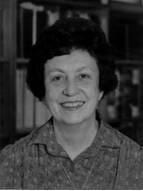Abstract
In this interview, Elizabeth Hortense Leduc recounts her educational background from undergraduate studies in biology at the University of Vermont, to obtaining her master’s degree from Wellesley College, getting her Ph.D. at Brown University, and completing a fellowship at Brown through the National Institute of Health. She frequently mentions the assistance she received during her Ph.D. program from J. Walter Wilson. She mentions her position as an anatomy professor at Harvard Medical School and the struggle for scientists to receive tenured positions. Leduc spends most of the interview discussing her time at Brown as a tenured biology professor and as dean of biological sciences. She remembers professors Herman Chase, Newell Stultz, and Pierre Galletti, in addition to President Donald Honig and Deans Margaret Shove Morriss and Rosemary Pierrel. She also recalls the effects of the Pembroke-Brown merger and the Lamphere case. Leduc emphasizes apparent female equality in the field of biology throughout the interview.
See also: An article in the Brown Alumni Magazine She Was the First.
Part 1
Part 2
Recorded on December 12, 1988
Interviewed by Karen Lamoree
Suggested Chicago style citation: Leduc, Elizabeth Hortense. Interview. By Karen Lamoree. Pembroke Center Oral History Project, Brown University. December 12, 1988.
Biography
Elizabeth Hortense Leduc was born in Rockland, Maine and grew up primarily in northern Vermont. She graduated from the University of Vermont in 1943 with a B.S. in biology. She went on to receive an M.S. from Wellesley College and a Ph.D. from Brown Univeristy in 1948, both in biology. She maintained a National Institute of Health postdoctoral fellowship at Brown until 1949 and then taught anatomy at Harvard Medical School until 1953 when she returned to Brown. In 1964 she became a tenured Professor of Biology and served as Dean of Biological Sciences from 1973-1977. During that time, Leduc was appointed to the President’s Committee on Science and Technology by Gerald Ford. Her research interest was in the cell biology of the liver. She died on January 30, 2010.
